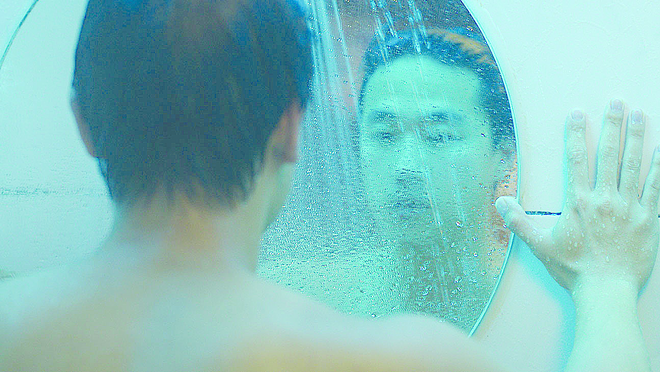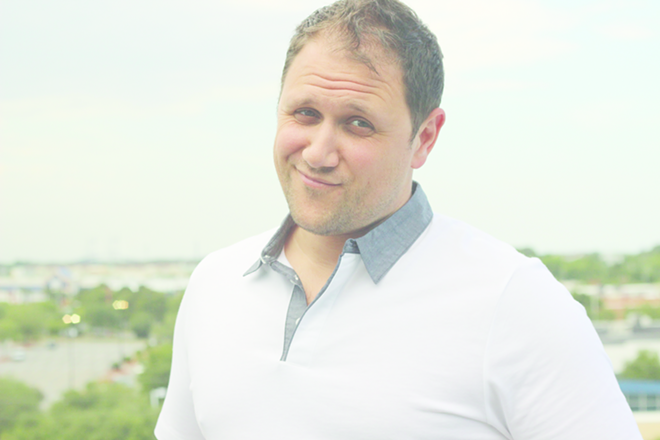Sunscreen Film Festival director Dwight Cenac II lives in Jacksonville.
He’s been logging untold hours hammering out the details of this week’s Sunscreen Film Festival in St. Petersburg, matching the name recognition of former guests such as John Travolta with the likes of Gary Busey and Paul Sorvino, combing through hundreds of submissions, and plenty of other duties, in order to make the fest’s 11th installment its biggest yet.
As past director Tony Armer — the festival’s cofounder — had before him, he does it on a volunteer basis.
“I do it on the side of everything else that I do that pays my bills,” he said. “It’s kind of a passion thing.”Cenac has helped out with the festival nearly since its inception, so it made sense to the board that he take its reigns after Armer stepped down to take a position as film commissioner at Visit St. Pete-Clearwater.
"Because of his familiarity and past work on Sunscreen and because of his being a filmmaker, being in the business, he just seemed like a natural fit,” said Armer, who remains on the board.
But should posting potentially offensive comments online under an assumed name on a private Facebook page come under consideration with regard to Cenac’s position with the festival? And would it be hypocritical to exclude an individual because his or her views might not align with those of others?
It depends on whom you ask.
The comments in question were brought to light by way of screen grabs sent to CL by a former associate of Cenac’s, St. Petersburg resident Moe Suliman (disclosure: Suliman and this reporter are friends). Suliman and Cenac have worked together on Sunscreen and other projects. Once close, they now call each other “frenemies.”
“It started out very friendly,” Suliman said. “We both have similar interests. We’re both are crazy about Star Wars. We like a lot of the same movies and we both love filmmaking.”
Suliman (who himself can have some pretty dark humor) said there came a point when Cenac’s comments stopped being funny.
“He’s the kind of person who is so fun to be around that when he says the things that he says, that are absolutely disgusting and abhorrent and not OK at all, you’re just kind of like, you know, ‘wow did you really just say that?’ But you kind of go with it because everybody likes him, and you like him, too,” he said. “It comes to a point where I just ran out of the ability to make excuses for him.”
Many of the things he's written on social media would likely make anyone who identifies as left-of-center seethe.
Included in the screen grabs Suliman sent were inflammatory remarks Cenac made under a pseudonym (which he admits using precisely to keep a firewall between his public role and his private views). Many were made at some politically tense points in time: last summer, when debate over the Confederate flag raged; during the recent debate over transgender bathroom use; and in the wake of a violent eruption in Chicago that caused Donald Trump to cancel a rally there in March.
He has an explanation for each, insists he’s not a bigot, and stresses the posts are on a personal page and do not in any way reflect the festival.
A post about an African-American protester who assaulted at a Trump rally might raise eyebrows.
“Blacks in Chicago disrupt a peaceful rally, incite violence cause a riot, shoot at people, steal things and basically do WHAT THEY ALWAYS DO EVERYWHERE. But all you see on Facebook is when one of them gets the punch-to-the-face they deserve,” read a March 12 post he wrote under the pseudonym, which was accompanied by a link to a Reddit user’s “firsthand account” of the event posted on the sub-Reddit r/TheDonald.
In an interview, Cenac said he’s not racist, and the intent of the post was to be provocative in order to spark a meaningful debate.
“That absolutely was an incendiary statement,” he said. “That was meant, again, to get the attention of people. I ended up having a wonderful debate in that one with a friend who vehemently disagreed, but that was the point. Let’s get a conversation going.”
In another post criticizing feminism, he writes, “[f]eminists are not strong people. When you say ‘I’m a feminist,’ what you’re really saying is, ‘I’m a pathetic person too weak to survive the real world.’”
And linking to a post about a New York City policy allowing transgendered individuals to use the public bathroom of their choice, he wrote that this is what happens “(w)hen you let the loonies run the asylum.” Other posts include comments critical of Muslims and Bernie Sanders supporters.
His comments on feminism, he said, are confronting semantics. He’s not going after women who want equal pay, voting rights and the right to own property — egalitarians, he said, but rather the group of people he says has co-opted the word in pursuit of special protections and unfair advantages.
“That’s not who I am attacking, it’s not who I’ve ever attacked,” he said. “Every time that I go after feminism, I’m going after the people who have taken that banner and abused it.”
As for the post about transgendered individuals, he said by no means do his comments reflect his views on LGBT equality, and the inclusion of films made by and for the LGBT community is a case in point. Since he’s the director of the festival, he has a say in what runs and what doesn’t, and that his actions as the festival director should matter more than what he says amounts to a little internet trolling.

Cenac is far from alone in being a public figure who gets called out for posting things on social media that may upset people. Before taking the reins at The Daily Show, host Trevor Noah faced tough criticism for some off-color tweets he posted years prior. Recently, baseball great and ESPN commentator Curt Schilling was fired from the network for tweeting offensive comments about transgendered individuals. In 2013, public relations professional Justine Sacco lost her job after tweeting “Going to Africa. Hope I don’t get AIDS. Just kidding. I’m white!” And so on.
Social media may be more than a decade old, but as a society, we’re still grappling with its implications within the professional realm, said Kelli Burns, a professor of public relations and mass comm at USF.
“We may have had those views in the past, but we didn’t have a bullhorn like we do today to share those views with the entire world,” Burns said. “We would share things with a few friends, but not in such a public forum.”
When you add the fact that anyone can screen-grab messages that were intended to either be private or (in the case of Snapchat) temporary, it’s practically impossible to have total privacy.“Anything that you say online could be made public,” she said. “You do have the freedom to express yourselves online, but you have to understand that it may come with some consequences.”
For those involved with the festival, there are mixed feelings on whether Cenac is a good fit for his position, in light of what he has said online.
Tampa-based actor Lucius Baston, a panelist at the festival, said he doesn’t mean to bash Cenac, but he doesn’t think one espousing such views should head the event.
“When you’re dealing with an air of entitlement or that no one else should be able to share the same rights, or you’re just insensitive to other people’s pain, there’s really no room for it,” he said. “The entertainment industry already has issues with inclusion as they’re moving forward to do better with it.”
Others, like Armer, the festival’s founder, say those comments are no indicator of the kind of person Cenac is and certainly don’t reflect the festival itself
.“Whatever his online persona that he chooses ... I really don’t know a lot about it,” Armer said. “I know that he’s had it. But I know that as a person, the guy that I’m friends with in real life, and not the online pseudonym, he’s a really good guy, and by no means would you consider him a racist or homophobe or any other sort of phobe.”
He said it’s important to keep in mind that regardless of what one person may express online, the festival has earned its own reputation as an important cultural event in the last decade.
“I think the festival represents itself,” he said. “It is an organization that has a bunch of people; the board of directors does a bunch of work. It’s not one of those boards that just sits back and votes on things and doesn’t do anything.”
For his part, Cenac said he can see how, even if what he wrote was pure hyperbole, his comments might turn people off. But he maintains that it’s part of a bigger conversation, and that to exclude him for his views, or the way he presents them, would not exactly reflect a spirit of tolerance.
“They’re either progressive or they’re not,” he said. “And correct me if I’m wrong, but the progressive movement, I thought, was all about diversity. The whole point is diversity.”


